ARAS Connections Special Edition: The 2016 Presidency Papers
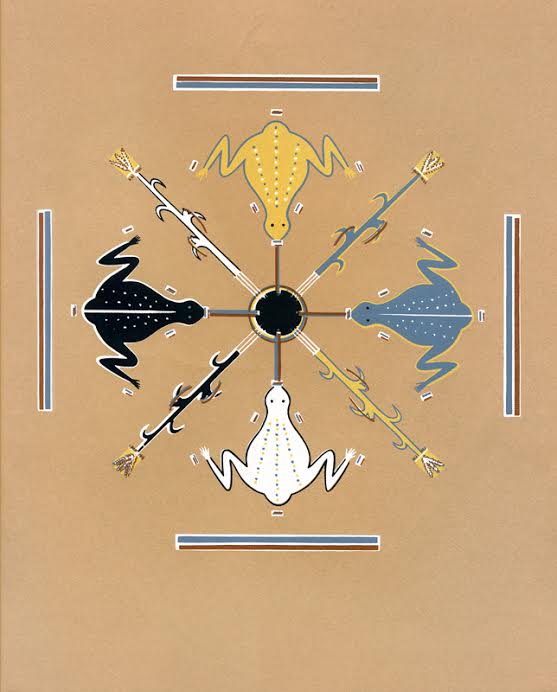
This special edition of ARAS Connections was born out of the recent San Francisco C.G. Jung Institute conference on Presidential Politics. As I was listening to the exceptional papers during the day and a half long conference, our fifth in this series of Election Conferences, I became aware of the fact that each of the presenters was using images in an unusually sensitive and evocative way that touched on what we at ARAS like to think of as the “symbolic imagination.” None of the presenters had been encouraged to use images to bring their talks to life; it was as if the material itself demanded the inclusion of symbolic imagery to enrich and amplify the word. In fact, often the image became primary and the word was used to give context to the image. As I became more and more aware of this as the conference proceeded, it occurred to me that this was perfect material for ARAS and for a special edition of ARAS Connections. ARAS is not just about the ancient, historic unfolding of symbolic imagery; it is also about the spontaneous emergence of symbolic imagery in contemporary life and that is a particular emphasis of our quarterly ARAS Connections.
ARAS is about the interface of word, image and meaning. We have all been challenged by the 2016 American Presidential election, struggling to understand what strange forces are at work in the collective psyche to produce such an unpredictable, disturbing, and even terrifying election year. What I like best about the papers we have collected in this special edition is that they have “legs”—the papers are both timely but also explore issues that have been and are going to be with us for some time. The papers are truly reflections in the sense of trying to get beneath the surface of rapidly unfolding day to day events in a wild election year and reflect back to us what is going on in the personal, cultural, and collective unconscious. These papers probe the psychology of our current times; they challenge us to think about and feel the meaning of what we have all been witnessing with obsessive fascination, disbelief, horror, boredom and almost daily prayers for this nightmare to end.
Reflections on Politics, Culture and Soul: A National Conference on the Psychology of the 2016 Presidential Election
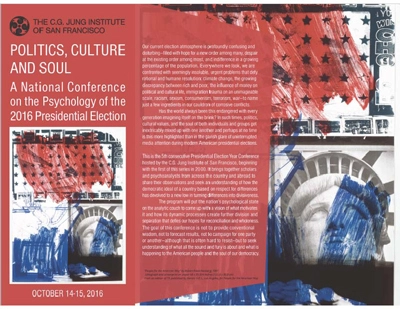
Table of Contents
Introduction by Thomas Singer, M.D.
1. Catastrophic Change: Cracked Social Containers and the Precarious Body Politic
Francisco J. Gonzales, M.D.
2. So, What Did You Expect? Personal and Depth Psychological Issues in Elections
Andrew Samuels
3. Politics, Character, and the Socially Mediated Candidate
Betty Sue Flowers, PhD
4. Response to Andrew Samuels and Betty Sue Flowers
Steve Zemmelman, PhD
5. Living on the Edge of the Apocalypse: What ISIS, the Christian Right, and Climate Change Deniers Have in Common
Richard Stein, M.D.
6. The Racial Shadow of American Politics
Fanny Brewster, PhD., MFA
7. Presidential Elections and Cultural Complexes
Thomas Singer, M.D.
Introduction to the Papers
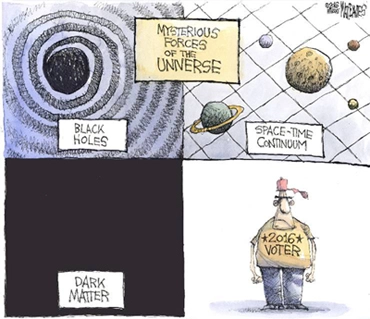
These are the papers from the fifth San Francisco C. G. Jung Institute Presidential election year conference which convened on October 14 and 15, 2016 and which I co-organized with Steve Zemmelman, Chair of the Extended Education Committee. In case your memory is sometimes as porous as mine, in 2000 it was Al Gore vs. George Bush. In 2004, it was John Kerry against George Bush. In 2008, it was Barack Obama against John McCain and in 2012 it was Barack Obama against Mitt Romney. In reviewing the text of the 2008 brochure of our Third Conference when Obama was running against John McCain, I was reminded that the previous 8 years (2000-2008) had been marked by the 9/11 attack on the World Trade Center, the destruction of New Orleans by Katrina, the invasion of Iraq by the United States, the spreading threat of Islamic fundamentalism, and the near collapse of the world economy at the end of President Bush’s second term when his approval rating was at a historic low. By the standards of those eight years between 2000- and the end of 2008, the past eight years with Obama as President seem relatively benign. And yet, no election year in recent memory has been as ugly, insubstantial and terrifying as 2016. Perhaps many of you will remember the infamous Reverend Wright of the 2008 election who may finally be right when he predicted: "the Chickens have come home to roost.” But, whether or not the last eight years have been good compared to the previous eight, we are living in what Christopher Hedges has characterized in the title of one of his books as "The Empire of Illusion: The End of Literacy and the Triumph of Spectacle”. The rational mind is challenged in the extreme and we need all the help we can get from those who explore the non rational mind to make some sense out of what is going on.
Everywhere we look, we are confronted with seemingly insoluble, urgent problems that defy rational and humane resolution: climate change, the growing discrepancy between rich and poor, including those who flock to Trump in the hope that his promise for change will halt their downward drift, the influence of money on political and cultural life, the virtual shutdown of Congress, immigration trauma on an unimaginable scale, racism, sexism, consumerism, terrorism, war—to name just a few ingredients in our cauldron of corrosive conflicts. Has the world always been this endangered with every generation imagining itself on the brink? In such times, politics, cultural values and the soul of both individuals and groups get inextricably mixed up with one another and perhaps at no time is this more highlighted than in the garish glare of the uninterrupted attention during modern American presidential elections.
The seeds for this fifth conference were first planted in a small gathering in Bolinas in 1999. About forty people met at the funky Bolinas Rod and Boat Club over a stormy weekend to discuss what we later called “The Vision Thing" which resulted in a published collection of papers about the interface of myth, politics, and psyche in the world. Some seventeen years later at this conference, we found ourselves talking about many of the same things —though it feels as though the state of the nation and our ability to engage in a substantive discourse have devolved far more than they have evolved. Three of us presenting at this conference, Andrew Samuels, Betty Sue Flowers, and myself, also presented at that original Bolinas meeting and our first Presidency conference—and I can say with certainty that we have solved nothing, but we have not stopped trying to understand what the heck is going on. I hope these papers will be fruitful for all who take the time to read them—if not in solving anything, at least in bringing to light some of the profound issues that effect all of us. The purpose of the conference and these papers is to surprise, engage, trouble, stimulate, challenge, anger, and perhaps even delight at times—and mostly I hope that they contribute in some small way to the development of what Joe Henderson called a "psychological attitude" in matters of politics, psyche and culture. With the help of John Beebe’s recent work on cultural attitudes we can think of a "psychological attitude" as a perspective that honors both the inner and outer world of the individual and the community and that combines empathy, integrity, and camaraderie—the ability to relate to and feel with others, the ability to tell the truth, and the ability to build bridges with people of different points of view. The psychological attitude that we would like to see in ourselves, our fellow citizens and our leaders, recognizes and accepts that in political discourse there is more than one way to go about tending to our common interdependence. A psychological attitude also has a keen awareness of the powerful forces that dwell in the psyche of individuals and groups that would antagonize and divide people if left to their own devices.
Catastrophic Change: Cracked Social Containers and the Precarious Body Politic
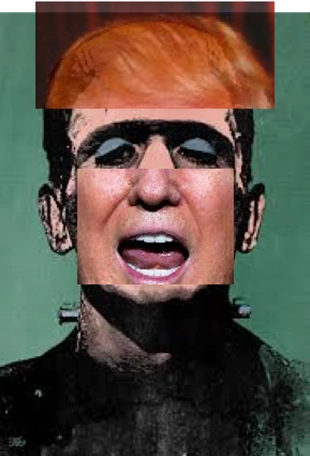
My family had recently immigrated to the United States from Cuba when the president of the United States, John F Kennedy was shot and killed. I remember watching the state funeral on a little black-and-white television set with my mother and younger sister. I was a couple of months short of five years old. This woman, the wife of the president, was American, I understood, and she was different from us. My parents were certainly no fans of JFK, having felt deeply betrayed by him in the Bay of Pigs fiasco, but they were shocked and dismayed by the assassination, and must have been swimming in complexly layered feeling about the tragedy that was unfolding in this new home of theirs. Mostly I remember my mother’s empathic grief and respect for the strength and dignity of Jacqueline Kennedy. I watched my mother’s face, and she watched Jackie’s. Jackie held the hand of little John; my mother held our hands and wept. I’ve come to think of this memory as an emblem of my American patriation, the complexly layered beginning of my becoming a member of these United States. Without the words to formulate it to myself, my young mind was turning over the question: for whom or for what was my mother weeping?
I entered these United States, then, in a time of cataclysm: both within my immigrant family and without, when the social containers of the nation seemed to be fissuring. JFK’s assassination was, disturbingly, only one of many in those years, of course.
Despite this turbulence within and without, my main preoccupations then were a child’s preoccupations, immediate, close at hand; I was thankfully buffered by the noisy din and easy love of an extended family that did its best to keep the press of adult worries out of the lives of small children. But I remember, many decades later, lying on an analytic couch and trying to describe a diffuse kind of anxiety I didn't have many words for, but unquestionably felt at that time. I was telling my analyst, somewhat jokingly, how I had been afraid of tornados (we had immigrated to central Texas - there had been a big twister on the news that devastated a town) and, more acutely, of “Communists.”
Read Catastrophic Change: Cracked Social Containers and the Precarious Body Politic in its entirety.
So, What Did You Expect? Personal and Depth Psychological Issues in Elections

It’s not a good idea to give a presentation on politics without some reference to its context. I don’t only mean the context of what we can call ‘the Trump election’, whatever the result, which is on and in everyone’s minds, but rather the context of the here-and-now, in this room tonight. Please allow me to do that before moving on to summarise the contents of this presentation.
This is the latest event in a long series. We seek to see how (and if) depth psychology and Jungian analysis can provide understandings of the political events of the day, coupling the spirit of the depths to the spirit of the times. The moving geniuses of this current enterprise have been Steve Zemmelman and Tom Singer and we owe them a huge debt of gratitude which I hope we will express in a moment.
Steve is a new friend. But there’s a bit more I want to say about my old friend Tom Singer’s contribution to the ‘Jung and politics’ game over twenty years and more. This role has truly been scene-shifting, whether as a theorist or as an impresario and facilitator. Tom and I have become correspondents, or should that be co-respondents?, agreeing and sparring, as we work out the lines of what he has so felicitously called an ‘inner sociology’. He is a credit to the San Francisco Jung Institute.
There’s a slightly wider Jungian context, too – and I want to say something about it, even though I realise that not everyone here is a Jungian analyst, therapist or psychologist.
In 2004, in a keynote at the Barcelona Congress of the International Association for Analytical Psychology, I said that we had witnessed a ‘political turn’ in Jungian analysis. I believed Jung would have silently approved of this development which has greatly intensified in recent years, given what he wrote in 1946 of ‘the analyst’s duties as a citizen’.
To fulfil the civic duties Jung mentioned requires contemporary Jungians to pay empathic attention to our relations with all of our fellow citizens and not just those who seem familiar. We may need to unlearn some (but not all) of the theories we have been taught. And, in an appropriate and relational way, we, in our moment, will find ourselves taking up a certain distance from what Jung, in his moment, wrote about Others.
Read So, What Did You Expect? Personal and Depth Psychological Issues in Elections in its entirety.
Politics, Character, and the Socially Mediated Candidate
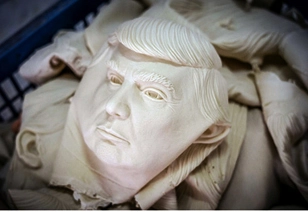
I’m speaking from the perspective of a Jungian-influenced literary critic who agrees with Peter Drucker that “Culture eats strategy for breakfast.” First: perhaps a “health warning” should be offered. Listen to what the critics had to say about Trump’s 1987 book, The Art of the Deal:
“Trump makes one believe for a moment in the American dream again.” [That was the NY Times critic.]
“The man has flair . . . It should be read because Trump is one of the Great Characters who help define New York’s peculiar urban style.”
And I agree with these critiques – not only about the book but about the Trump phenomenon itself. Trump has convinced 40% of Americans to believe in him. And “flair” is one way to describe his flamboyant performance of electoral politics.
But there are more colorful cultural critiques than “flair” these days: Hillary has been compared to a witch and Trump to Hitler in spite of the dampening effect of Godwin’s law, which the Oxford English Dictionary defines as follows: “A facetious aphorism maintaining that as an online debate increases in length, it becomes inevitable that someone will eventually compare someone or something to Adolf Hitler or the Nazis.”
My former student, Mike Godwin, who originated Godwin’s law, has an addendum for this election. Mike has said, “If you're thoughtful about it and show some real awareness of history, go ahead and refer to Hitler or Nazis when you talk about Trump. Or any other politician.”
Mike – I’m not going to go there.
Read Politics, Character, and the Socially Mediated Candidate in its entirety.
Response to Andrew Samuels and Betty Sue Flowers
Both these talks are gems and I feel privileged to be in the company of such creative and ethical minds. I want to thank Andrew and Betty Sue for making the long journey to be with us, and to share their intelligent, challenging, thoughtful, pithy, humorous takes on different but related dimensions of the current situation in the polis.
Where we locate ourselves as individuals within a community of analysts and psychotherapists living in the bubble of a highly educated urban community like the Bay Area is at the core of what I wish to contribute to the discussion as respondent. For myself, coming from a very solid working class background with immigrant grandparents who fled the pograms of Eastern Europe, a father who worked nights sorting mail in the Brooklyn post office and a mother who worked as a typist in Manhattan, I have been privileged to be able to live out a version of the American dream. I share this snippet of my story because it gives you a sense of where I place myself within the broader narrative of how for so many the promise embedded within the story of working people in this country is drifting further and further away. I see both Andrew’s and Betty Sue’s talks as reflective of their respective locations, and as they plumb the depths of individual and collective psyche in this election, I wonder how much they are able to account for the fear and resentment underlying the loss of the myth – and the reality - of working and middle-class America.
Betty Sue points out how we are witnessing a deeply disturbing shift that substitutes persona for character, where image becomes increasingly independent of character. Her analysis of the problem goes further to show how authenticity, normally thought to relate to a universal standard of character, is being redefined as a congruence between the image one wishes to project of him or herself on the one hand and how one performs that image on the other. She argues that there is a confusion of authenticity with truth. She taps into the anger characterizing the spirit of the times, an anger in which she also astutely sees as a necessary, attractive energy of the id. In this light, I want to note Gail Collins observation in yesterday’s NYT: “Boring people have never looked better.”
Read Response to Andrew Samuels and Betty Sue Flowers in its entirety.
Living on the Edge of the Apocalypse: What ISIS, the Christian Right, and Climate Change Deniers Have in Common
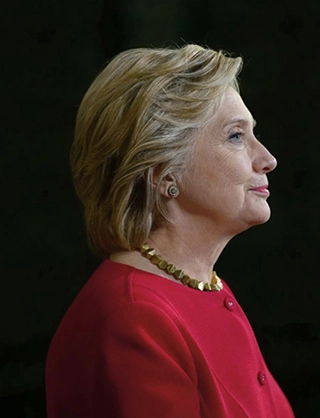
A couple of years ago, I walked out to the beach with an old friend who was visiting from India; it was a beautiful, warm day in January, right after a storm, and the air was crystal clear and the sea calm. As we sat and watched the waves, I said, “It's too bad you can't have a winter day like this anymore and not think about global warming.” He paused, then said, “I wasn't thinking about global warming.” After a good laugh, we changed the subject to how great it was for him to be back in California.
Ever since then, I've taken more careful note of how much we live in a doom and gloom thought machine, about everything from the environment, to the economy, to wars, pollution, and now, of course, the politics of the upcoming election (which seems to have been upcoming for the longest time.) I remember, when I was growing up in the deep South during the Cold war, the nonsensical fire drills to prepare for a nuclear attack. The local air force base in Montgomery was known to be on a Soviet target list, so the Cuban missile crisis felt viscerally scary, even by today's color coded danger levels; and the fantastical idea that hiding under a wooden desk would somehow prevent me from being burnt to a crisp sowed the first seeds of my mistrust in the government.
Read Living on the Edge of the Apocalypse: What ISIS, the Christian Right, and Climate Change Deniers Have in Common in its entirety.
The Racial Shadow of American Politics
Some things have changed since I first wrote the introductory paragraph about my topic for the brochure that announced this conference. As events have unfolded, the shadow of which I speak this afternoon has revealed more of itself - especially with respect to racial issues. What have we learned about our racial selves and shadow that we did not know before Donald Trump became the Republican Party’s nominee? How has this learning affected us on a conscious level and what is the unconscious material that remains - waiting to push and shove and eventually to emerge - and demand that we change? How does race in American politics create a tension of opposites? And, finally, where is the third that will come to support a different kind of being and new ways of thinking that will move us to another place where skin color is no longer the primary factor in how we choose to live and how we co-exist with one another?
My family roots are Southern and go back through the generations to my ancestors who arrived in Charleston, South Carolina, aboard a slave ship. During my talk today I will refer to aspects of this Southern life because it has in fact helped create the racial complexes into which I fall. I will weave my personal story, with its resonances of racial complexes, in and out of this talk.
I begin my narrative today with a few thoughts about the shadow. Many, if not all of us have learned about and worked with shadow as a Jungian concept, either as analysts, clients, students, or from having an interest in Jung’s work. We think of shadow as Jung first spoke of it: that function of psyche that wants to hide our secrets, embarrassments, and sufferings away from the eyes of others. Shadow is also what enables us to project onto the other. It gives us license to see the failings and faults of those around us (rather than in ourselves) in our various collectives of family, friends and strangers. In the realm of politics, we will be looking today at the shadow of racism in the American psyche. This is particularly challenging because our American racial shadow normally has some trickster energy, and I believe this is especially true in this election where trickster has shown up as an activation of the archetypal, collective energy in which we witness distortions and lies, like my grandmother used to say, “right in my face without no shame.” We can’t believe our ears! It has been an election of continuous revelation of the deepest parts of our collective racial shadow. I honestly had no idea when this election campaign began that I would feel myself caught so thoroughly in the energy of trickster or that I would come to see so clearly how the American racial shadow as a collective experience tricks us into believing we are separate from one another because of the accident of skin color.
Read The Racial Shadow of American Politics in its entirety.
Presidential Elections and Cultural Complexes
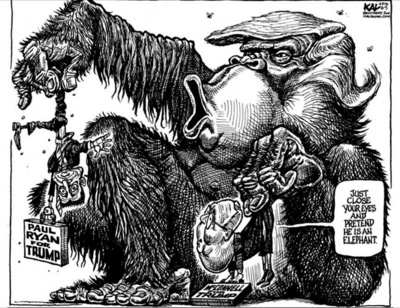
When small men begin to cast big shadows, it means that the sun is about to set.
Lin Yutang, writer and translator. (10 October 1895-1976)
What a trip we have been on this past year!!!!—a roller coaster ride into a black hole that has sucked up too much of our time and energy, altering for many of us the space time continuum. As one of my son’s friends’ put it: “Trump has been groping the American psyche for a year and a half.” It will soon be over and I hope that our lives will be less burdened by the gravitational pull of the “dark matter” of this interminable election.
If, as Marshall McLuhan said, “the media is the message,” Donald Trump has taken over the world. Having Trump run for President is like having a terrorist bomb bring down an airplane every day—huge, dire excitement that incites obsessive attention. After dominating daily Google searches for all of 2016, Trump was finally out searched for a few days in late May when Americans frantically Googled “gorilla” because zookeepers at the Cincinnati Zoo shot Harambe, a 17-year-old lowland gorilla when a 4-year-old boy fell into the primate’s enclosure.
Of all the graphs and statistics I have seen during this election cycle, somehow this chart comparing searches for Gorilla vs Trump says more to me about what captures our attention in this country than any other that I have been following. At about that same time in May, one cartoonist put Gorilla and Trump together, perhaps synchronistically.
Read Presidential Elections and Cultural Complexes in its entirety.
Contents
- Reflections on Politics, Culture and Soul: A National Conference on the Psychology of the 2016 Presidential Election
- Introduction to the Papers
- Catastrophic Change: Cracked Social Containers and the Precarious Body Politic
- So, What Did You Expect? Personal and Depth Psychological Issues in Elections
- Politics, Character, and the Socially Mediated Candidate
- Response to Andrew Samuels and Betty Sue Flowers
- Living on the Edge of the Apocalypse: What ISIS, the Christian Right, and Climate Change Deniers Have in Common
- The Racial Shadow of American Politics
- Presidential Elections and Cultural Complexes
Become a Member of ARAS!
Become a member of ARAS Online and you'll receive free, unlimited use of the entire archive of 17,000 images and 20,000 pages of commentary any time you wish—at home, in your office, or wherever you take your computer.
The entire contents of three magnificent ARAS books: An Encyclopedia of Archetypal Symbolism, The Body and The Book of Symbols are included in the archive. These books cost $330 when purchased on their own.
You can join ARAS Online instantly and search the archive immediately. If you have questions, please call (212) 697-3480 or email info@aras.org
We Value Your Ideas
As our newsletter grows to cover both the ARAS archive and the broad world of art and psyche, we're eager to have your suggestions and thoughts on how to improve it. Please send your comments to info@aras.org. We look forward to your input and will reply to every message.
Subscribe
If you're not already a subscriber and would like to receive subsequent issues of this newsletter by email at no cost, e-mail us at newsletter@aras.org.
